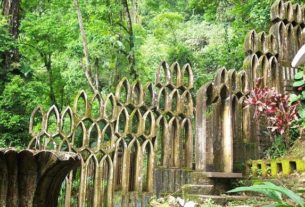An original short story set in Mexico
When I moved to La Ribera, a small pueblo just north of Cabo San Lucas in Baja California, Martín was already a fixture on my little dirt street. At first, I felt uneasy when I saw this strange Mexican near my gate; but over time I feared him less, then began to expect him, walking barefoot back and forth past my house. Day after day, he shuffled through the dusty lanes of the pueblo looking in garbage cans, scanning the unpaved paths and empty lots for anything of use. Some days would find him returning to the cold comfort of the old abandoned icehouse near the beach with several bags of things he thought had enough value to be hefted and carried home. This home, a crumbling concrete and rusting steel bunker, was a stone’s throw from the Pemex gas station operated by his well-fixed brother Roberto. I was told they did not speak.
As he walked, he collected used clothing, pieces of metal, cloth – the bottom layer of things that had come to the end of their uselife in the saddest way. At times, his worn-out contraband could not be carried in a sack. Then, he carried bright pieces of plastic in his bare hands – remnants of broken toys, parts of discarded furniture or appliances. Perhaps the things held a special utility we could not see. Maybe he breathed a certain beauty into them. A few of these things could be seen on what was once a loading dock but was now the front porch of the place he called home. All the rest was inside this concrete shell – no windows, no water, no electricity, no bathroom.
I tried to imagine what it was like in there. Was it just empty space-a large, dark, cement tomb filled with random heaps of things? Or were the things arranged in some fashion that pleased him, calmed his restless spirit with a sense of order? A human bowerbird, who or what could he invite with the display?
A shriveled peanut left brain could have explained his possible idiot savant obsession with the creation of his new-age art arrangements, but so far as I knew no friend, relative or social services organization ever considered taking him to the Military Hospital in La Paz for a brain scan, let alone giving him a bath or clean clothes. To my knowledge, in his 54 years in the village, he had never been arrested, confined, hospitalized, fingerprinted, examined or counseled.
In the United States those who live on the streets are called homeless, but Martín had a home. He did not live on the streets, he walked the streets. He foraged, never stopping any longer than was necessary to examine, gather or discard, and move on.
He was about six feet tall and, as you might imagine, he was lean. His skin showed the weather, his poor posture looked contrived. Always barefoot, he walked not only the streets of this village but the main highway and the byways of villages nearby. I have seen him in Los Barriles (about 15 miles from this little village) and in Santiago (a little further). His hair was remarkable – a natty black going grey, it never grew long.
Obsessed with dental cleanliness, he always carried toothbrush and paste. He begged, stole or bought enough fresh water for his daily personal needs. If he bathed it was not in the ocean, since I never saw him go near the beach. In overall demeanor I can say he smiled more than frowned: at times he raged at things other could not see or imagine in that high-pitched falsetto that announced his arrival. The pitch would Doppler to a less strident sound as he moved onto the next alleyway.
He made mistakes. Once I saw him inspecting roadkill – the remains of a chicken. I slowed the truck to watch him in my rear view mirror. He held the bloody, crumpled thing in two fingers, at arm’s length as though it might explode. He turned it, held it high to see the underside, put it in his bag.
For much of his food, he depended on the tropical fruit hanging from trees all around the village (he only took what he could reach from the street.) Once he foolishly ate green grapefruit, including the rind, and his mouth and lips were one big blister for more than a week.
His disappearance was a mystery. His brother (after two weeks of my urging) finally checked the old icehouse. The police checked there too, then just shrugged and said there had been no reports of accidents, of Martín’s demise, incarceration, or illness that caused him to be hospitalized. Others said, “possiblemente se fue,” maybe he went away.
I can’t fully explain how I feel right now. The best I can do is say “I miss him.” Maybe others in the pueblo feel the same sense of frustration, a strange kind of hollowness and loss. He was as much a part of this town as the schools, the stores, the streets themselves. It is as though someone has stolen a small but important piece of our little town. The streets he walked are too quiet. Maybe he was our own old broken thing we now find some use for. Only now do we see that he was an odd but indispensable part of the arrangement.


